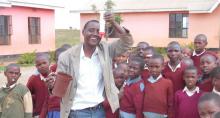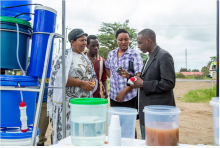Tanzanian scientist proposes nano innovations to address health problems
Dr Askwar Hilonga hopes to be a millionaire – with the millions of lives across Africa that his innovation can help improve
Locals in Arusha, northern Tanzania, have noticed something unusual this year: no cholera outbreak during what is usually the cholera season. Could a new low-cost water purification system, piloted in water stations across the city, may have something to do with it?
Dr Hilonga does not claim this, as he understands rigorous testing is still needed. He nevertheless hopes his invention will help reduce waterborne diseases.
After obtaining a doctorate in chemical engineering, he studied public health in the hope of finding new ways to protect people from preventable diseases. “After graduating, I asked myself what my degrees meant for my community. I was not going to be satisfied with patents and papers that would just sit gathering dust on the shelf. So I decided to only do research that would result in innovative solutions for improving the lives of my community.”
When engineering and health expertise meet
Growing up in rural Tanzania, Dr Hilonga suffered from waterborne diseases throughout his childhood. He used his scientific expertise in nanotechnology and his local knowledge to develop a filter based on nanomaterials. It was meant to help those for whom safe drinking water was still a luxury, like it was for his family during his childhood.
“There was a problem, and there was technology. I told myself, let me look for a solution by combining the two, to find the solution,” he says. “Engineers do not understand health,” he smiles, “neither do doctors and health practitioners understand technologies. I wanted to show the natural bond between the two.”
Local solutions for local problems
Hilonga worked with the Ministry of Health and the Ministry of Science and Technology to roll out his innovative water purification system.
He cherishes the support he was given by the Government, the health authorities, the media, and local communities. Everyone was proud of the young Tanzanian scientist for addressing a major public health problem.
He says the real challenge for any water-purification system is acceptance and regular use by the community. Many were initially suspicious about a technology developed by ‘one of theirs’.
But Dr Hilonga was able to convince local people to start using the filtration system because he understood the issues they faced.
Empowering local women – the biggest reward
Dr Hilonga says women have been instrumental to introducing water filtration as part of daily life in rural Tanzania. Most of the water stations where the new system is being tested are managed by women.
“I would not have made it, if it were not for the local women who got on board and made it possible.”
His goal is to encourage water purification good practices across Tanzania and other African countries where rural populations suffer from waterborne diseases.
He says his dream is to become a millionaire, counting the millions of lives to be improved with access to safe clean drinking water.
Hilonga’s contribution to expanding access to safe water, and thereby reducing the risk of waterborne diseases among rural communities is being recognized at the 72nd World Health Assembly this year, where he will receive the 2019 United Arab Emirates Health Foundation Prize.
He has previously received the President of Tanzania’s National Health Innovation Award (2016) and the Africa Prize for Engineering Innovation (2015), conferred by the British Royal Academy of Engineering.
Disclaimer:
A water treatment device cannot be confirmed to efficiently protect populations from waterborne disease and to minimum health performance standards before it undergoes rigorous testing under WHO’s scheme to evaluate household water treatment technologies. To assist Member States in verifying performance, WHO has established the International Scheme to Evaluate Household Water Treatment Technologies.







